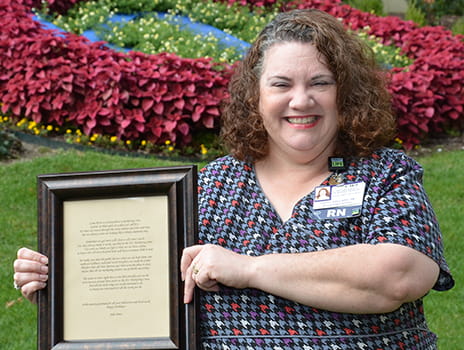- Home
- News Room
- Patient Stories Search Page
- Nurse Becomes Thyroid Cancer Patient
August 13, 2019
The tiny, painless lump at the base of Kathy Gaillard’s neck seemed so insignificant she didn’t mention it during a doctor’s exam.
“Probably nothing,” she remembers thinking.
Yet Kathy, a registered nurse in blood and marrow transplant at The University of Kansas Cancer Center, too often had witnessed the devastating consequences of dismissing such symptoms as “probably nothing.” When the lump was still present a few months later, she had her doctor take a look. Within hours, Kathy reported for a sonogram of her thyroid.
No need to panic, she thought. Most thyroid nodules are benign. But when the technician continued to take image after image, she grew suspicious. Her suspicions were confirmed: The radiology report indicated a high likelihood of thyroid cancer.
“Being a cancer nurse, I knew thyroid cancer was very treatable, very curable,” she says. “My husband and parents were much more upset. I had to keep reassuring them I’d be OK.”
In agreement with the radiologist’s findings was Terance Tsue, MD, a renowned specialist in head and neck cancer surgery at the cancer center. He outlined 3 options:
- Wait and watch
- Perform a fine-needle aspiration biopsy to get a conclusive diagnosis before proceeding
- Surgically remove the thyroid gland
“Easy decision – I wanted surgery,” Kathy says. “I felt like I had a foreign invader in my body and I wanted it out!
"Being on the opposite end of cancer care felt strange," she admits. “I had to remind myself to act like a patient and do what they told me to do."
Surgery revealed 2 types of thyroid cancer. The nodule she’d felt was papillary carcinoma, which accounts for 8 in 10 thyroid cancers. This type often spreads to lymph nodes in the neck, but fortunately for Kathy, this wasn’t the case. A smaller nodule was follicular carcinoma, the next-most common type.
“Dr. Tsue was fantastic,” she says. “Very direct and straight-forward. He answered all of my questions and reassured me every step of the way.”
Three weeks later, Kathy’s radiation treatment involved a dose of radioactive iodine, which meant she had to stay 10 feet away from others for 3 days and then 3 feet away for 10 days. The treatment was roughest on her husband, she joked, because it forced him to sleep on the sofa for the duration.
Without a thyroid, Kathy must take a daily thyroid hormone. Fine-tuning the dosage took frustrating months of wild mood swings and caused a 30-pound weight gain.
That was 4 years ago. Today, Kathy remains cancer-free.
To express her appreciation to Dr. Tsue and her entire cancer care team, Kathy posed for posters promoting The University of Kansas Hospital’s 2015 Employee Campaign. Her donation supports the Cambridge North Tower expansion. The new building on the hospital’s main campus includes additional facilities for ear, nose and throat cancer care.
Request your appointment today.
To make an appointment at The University of Kansas Cancer Center, call 913-588-1227.
As with all treatments, individual patient results vary. It is important to discuss your treatment options with your healthcare provider.
